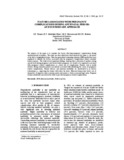| dc.contributor.author | Tomal, J.H. | |
| dc.contributor.author | Khan, H.T. Abdullah | |
| dc.contributor.author | Hossain, M.Z. | |
| dc.contributor.author | Shabuz, M.Z.R. | |
| dc.date.accessioned | 2010-10-18T05:36:09Z | |
| dc.date.available | 2010-10-18T05:36:09Z | |
| dc.date.issued | 2005 | |
| dc.identifier.uri | http://hdl.handle.net/10361/538 | |
| dc.description.abstract | The purpose of the paper is to examine the factors affecting pregnancy complications during antenatal period of mothers. The study uses data which have been repeated over time i.e., the nature of the data is longitudinal in type. Thus the generalized estimating equation (GEE) method has been employed to identify the factors associated with the pregnancy complications which constitute binary response. The study reveals important findings. Among others, education of mothers, taking special food during pregnancy and desired index pregnancy are found to be negatively associated with pregnancy related complications i.e., lower risk of complication. Patients visit to health workers during antenatal period is positively associated with identifying the causes of pregnancy related complications. Female literacy and maternal morbidity are intertwined in an inverse relationship i.e., improving the former will reduce the latter. Educated women take better care of themselves. It improves their economic power and ensures a better social and legal status. Pregnant women should take special food in order to get rid of pregnancy related complications. | en_US |
| dc.language.iso | en | en_US |
| dc.publisher | BRAC University | en_US |
| dc.relation.ispartofseries | BRAC University Journal, BRAC University;Vol.2, No.2,pp. 13-22 | |
| dc.subject | GEE | en_US |
| dc.subject | Maternal morbidity | en_US |
| dc.subject | Follow-up Data | en_US |
| dc.title | Factors associated with pregnancy complications during antenatal period: an extended GEE approach | en_US |
| dc.type | Article | en_US |

